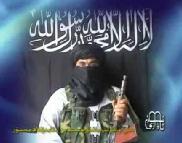 |
|
A Uighur terrorist, thought to be Abdul Haq al Turkistani, from a videotape released by the Eastern Turkistan Islamic Party in 2008. |
Abdul Haq al Turkistani, a member of al Qaeda’s Shura Majlis and the leader of the Eastern Turkistan Islamic Party (ETIP), a terror group that seeks to establish an Islamic emirate in western China and Central Asia, is thought to have been killed in a US airstrike in Pakistan in February, US intelligence officials told The Long War Journal.
Turkistani likely was killed in the Feb. 14, 2010, strike on a compound in the village of Zor Babar Aidak near Mir Ali in North Waziristan, officials said. US Predators fired two missiles at the compound, which was being used as a secret training camp. Five terrorists, including Turkistani, were reported killed in the strike.
The town of Mir Ali is a known stronghold of al Qaeda leader Abu Kasha al Iraqi, an Iraqi national who is also known as Abu Akash. He has close links to the Taliban and the Haqqani Network. The Haqqani Network and Hafiz Gul Bahadar also have influence in the Mir Ali region.
The Eastern Turkistan Islamic Party is known to operate in the Mir Ali region along with the Islamic Jihad Group, an offshoot of the Islamic Movement of Uzbekistan.
The Pakistani government claimed in May that Abdul Haq had been killed, when Interior Minister Rehman Malik made an announcement during a conference in Beijing, China. At the time, Malik stated that the terror group’s “back is broken” and that the group is no longer viable inside Pakistan.
But the Eastern Turkistan Islamic Party is still known to operate in North Waziristan. A “group of hundreds of militants” from the Eastern Turkistan Islamic Party is said to be in the region, US intelligence officials told The Christian Science Monitor.
Although the Eastern Turkistan Islamic Party has not officially announced Turkistani’s death, Abdul Shakoor is said to have taken control of the terror group.
Abdul Haq is one of the top two terror leaders thought to have been killed in a Predator strike this year. Mustafa Abu Yazid, formerly al Qaeda’s leader in Afghanistan and its top financial official, was killed in a Predator strike in Datta Khel in North Waziristan on May 21, 2010. [See LWJ report, Senior al Qaeda and Taliban leaders killed in US airstrikes in Pakistan, 2004 – 2010, for the list.]
Background on Abdul Haq al Turkistani and the Eastern Turkistan Islamic Party
Abdul Haq, who is also known as Maimaitiming Maimaiti, became the leader of the Eastern Turkistan Islamic Party in late 2003 after Hassan Mahsum, the group’s previous leader, was killed in Waziristan, Pakistan.
Al Qaeda appointed Abdul Haq to its Shura Majlis, or executive leader council, in 2005, according to the US Treasury Department, which designated him as a global terrorist in April 2009. The United Nations also designated Haq as a terrorist leader.
He was considered influential enough in al Qaeda’s leadership circles that he was dispatched to mediate between rival Taliban groups as well as to represent the Shura Majlis in important military matters. In June 2009, Abdul Haq was spotted in Pakistan’s tribal areas attending an important meeting with Baitullah Mehsud, then Pakistan’s overall Taliban commander. Abdul Haq and a senior delegation of Taliban and al Qaeda leaders traveled to Pakistan’s tribal areas to discuss the Pakistani military’s operation in South Waziristan. Among those in attendance were Siraj Haqqani, the military commander of the deadly Haqqani Network; and Abu Yahya al Libi, a senior al Qaeda ideologue and propagandist.
The Treasury Department said Abdul Haq has sent operatives abroad to raise funds for attacks against Chinese interests both at home and abroad. He also was involved with recruiting, propaganda efforts, and the planning and execution of terror attacks. In early 2008, Haq openly threatened to conduct attacks at the Olympic Games in Beijing.
He was last heard from in August 2009, when he threatened to attack Chinese embassies worldwide as well as targets within the country.
Prior to the US invasion of Afghanistan in October 2001, Abdul Haq ran a training camp for his recruits at al Qaeda’s camp in Tora Bora in Afghanistan’s Nangarhar province [see LWJ report, “The Uighurs in their own words”]. He later reestablished camps for the Eastern Turkistan Islamic Party in Pakistan’s lawless, Taliban-controlled tribal areas. The Chinese government has pressured Pakistan to dismantle the camps.
Despite Abdul Haq’s connections to al Qaeda, and the Eastern Turkistan Islamic Party’s role in the global jihad, the US is releasing fighters belonging to the terror group from the Guantanamo Bay detention facility. Of the 22 Eastern Turkistan Islamic Party detainees captured on the battlefield in Afghanistan in 2001 and 2002, only seven remain in custody. Five were transferred out of custody by the Bush administration and 10 more by the Obama administration.








2 Comments
SEVEN months later, and we get news that it’s a HVT!!! I can’t WAIT to hear what we’ve bagged and tagged THIS month when April 2011 rolls around! I wish we didn’t have to wait so long to hear… but I’m an impatient American. To the guys at Nellis AFB (or wherever they are) flying these Preadators and Reapers: good work!!!
@Steve337. Agree with your comments. I think the UAV operations are up at Creech AFB in Indian Springs, NV.